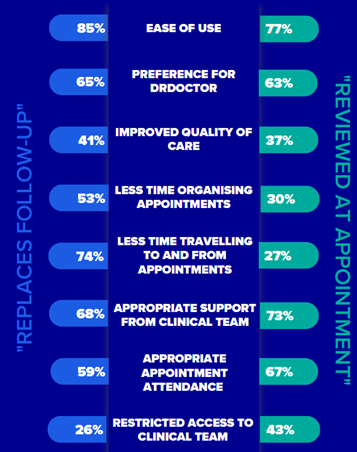What is an evaluation and why is it important?
An evaluation is a critical assessment of a solution in a real-world setting. By using a mixed methods approach, an evaluation can provide quantitative and qualitative insights into the effectiveness, efficiency, acceptability, equity, and feasibility of its implementation. Commonly used data sources can include process data, patient and staff surveys, interviews, focus groups and outcome data.
An evaluation conducted by an independent evaluator can help with demonstrating and evidencing impact for interested audiences, such as care providers, commissioners, and regulatory bodies. Sharing findings of an independent evaluation can help secure funding and guide decision making for wider adoption.
My Online Care Evaluation
The demand for outpatient healthcare has risen by nearly 50% over the last decade and reached 124.9 million appointments in England in 2020 (NHS Digital, 2022; NHS England, 2019). The digitalisation of care services aims to restore healthcare worker capacity, reduce treatment backlog and improve patient quality of life.
My Online Care is a digital outpatient management solution. Through a desktop and mobile-based digital care delivery platform, provided by DrDoctor, it allows patients to complete questionnaires regarding their care. Based on the patients’ questionnaire responses, clinicians are able to identify and avoid clinically unnecessary follow-up appointments or streamline clinical data collection ahead of appointments.
With the support of Health Innovation East Midlands (previously known as East Midlands AHSN), Unity Insights conducted an independent mixed-methods evaluation of the My Online Care implementation at Nottingham University Hospitals NHS Trust. Findings demonstrated that the digital health questionnaires were used effectively and created time savings as well as improved personalisation and quality of care. My Online Care was found to be easy to use and overall well-perceived by patients and staff.
Recommendation for technical improvements, and implementation and workflow guidance could help ensuring a successful wider adoption of My Online Care.
Our evaluation provided evidence of the effective use and benefits associated with the implementation of My Online Care, including:
Increased personalisation of care
- The majority of patients noted that they felt supported by the clinical team and were only asked to attend relevant appointments. This observation could suggest that most patients felt doctors were identifying their needs correctly (i.e., through more personalised care).
- An increase in care capacity could allow for the provision of personalised care and reduce waiting times which could have impacts on patients’ longer-term health outcomes.
Standardisation of patient outcome documentation
- The clinician responses were positive across a variety of statements assessing workflow efficiencies, appropriateness of the questionnaire, and standardisation of care.
- The standardised questionnaires allowed patients to be screened for a wide range of health concerns; clinicians tend to ask patients different questions during F2F appointments so may not screen patients fully.
Improved quality of care
- Digitising care services aims to restore healthcare worker capacity, reduce treatment backlog and improve patient quality of life.
Potential time savings
- The majority of patients agreed that they spent less time travelling to and attending appointments but did not necessarily experience time efficiencies when organising appointments due to My Online Care. Perceived time savings due to the use of My Online Care were mostly seen in “replaces follow-up” pathways but found a smaller proportion of agreement and a small proportion of disagreement within “reviewed at appointment” pathways.
- Most clinicians suggested that the solution results in efficiencies such as a reduction in appointment time, supporting the efficiency of appointments and administrative processes.
- Clinicians were able to spend more time providing care to patients who need to be seen and reducing the appointment backlog.
The above listed impacts have contributed to positive patient and staff experiences of the solution.

Clinicians reported positive opinions on the technical delivery, training and technical support of the solution and identified benefits of:
- My Online Care questionnaire responses effectively enabling pathway decisions
- More standardised patient care
- Increased efficiency of appointments and administrative processes
- Time savings resulting in more time for the review of cases with complex needs
- More personalised patient care
Health Innovation East Midlands thank Unity Insights for their work on the Digital Outpatients evaluation project and for being proactive, responsive and flexible to our needs throughout the project.
I hope this evaluation will help to drive further adoption of digital innovations with the potential to keep our patients cared for without unnecessary hospital attendances.
Get in touch with us
- Phone
- Email enquiries@unityinsights.co.uk
